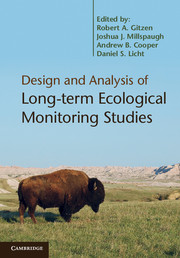Book contents
- Frontmatter
- Contents
- List of contributors
- Foreword: Ecology, management, and monitoring
- Preface
- Acknowledgments
- Abbreviations
- Section I Overview
- Section II Survey design
- Section III Data analysis
- 11 Analysis options for estimating status and trends in long-term monitoring
- 12 Analytical options for estimating ecological thresholds – statistical considerations
- 13 The treatment of missing data in long-term monitoring programs
- 14 Survey analysis in natural resource monitoring programs with a focus on cumulative distribution functions
- 15 Structural equation modeling and the analysis of long-term monitoring data
- Section IV Advanced issues and applications
- Section V Conclusion
- References
- Index
- Plate Section
15 - Structural equation modeling and the analysis of long-term monitoring data
Published online by Cambridge University Press: 05 July 2012
- Frontmatter
- Contents
- List of contributors
- Foreword: Ecology, management, and monitoring
- Preface
- Acknowledgments
- Abbreviations
- Section I Overview
- Section II Survey design
- Section III Data analysis
- 11 Analysis options for estimating status and trends in long-term monitoring
- 12 Analytical options for estimating ecological thresholds – statistical considerations
- 13 The treatment of missing data in long-term monitoring programs
- 14 Survey analysis in natural resource monitoring programs with a focus on cumulative distribution functions
- 15 Structural equation modeling and the analysis of long-term monitoring data
- Section IV Advanced issues and applications
- Section V Conclusion
- References
- Index
- Plate Section
Summary
Introduction
The analysis of long-term monitoring data is increasingly important; not only for the discovery and documentation of changes in environmental systems, but also as an enterprise whose fruits validate the allocation of effort and scarce funds to monitoring. In simple terms, we may distinguish between the detection of change in some ecosystem attribute versus the investigation of causes and consequences associated with that change. The statistical framework known as structural equation modeling (SEM) can contribute to both detection of changes and the search for causes. This chapter summarizes some of the capabilities of SEM and shows a few ways it can be used to model temporal change. Because of its ability to test hypotheses about whether rates of change are zero or nonzero, it can be used for change detection with repeated-measures data. As more of the capabilities of SEM are presented, its capacity for evaluating causal networks is highlighted. Here is where its potential for making a unique contribution to the analysis of long-term monitoring data is revealed. Thus, one's primary motivation for using SEM with monitoring data will be to investigate hypotheses about what factors may be driving change (Box 15.1).
Information
- Type
- Chapter
- Information
- Design and Analysis of Long-term Ecological Monitoring Studies , pp. 325 - 358Publisher: Cambridge University PressPrint publication year: 2012
Accessibility standard: Unknown
Why this information is here
This section outlines the accessibility features of this content - including support for screen readers, full keyboard navigation and high-contrast display options. This may not be relevant for you.Accessibility Information
- 3
- Cited by
